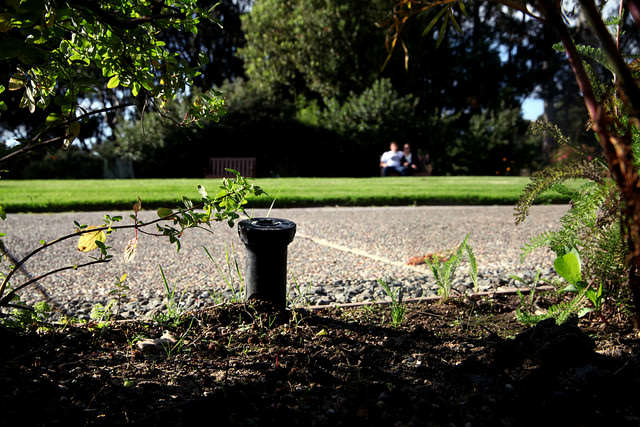City utility officials approved double rates to take effect Oct. 1 for customers who do not reduce their water consumption by at least 10 percent of what they used during the corresponding month last year.
The San Francisco Public Utilities Commission (SFPUC) approved the mandate, which applies to customers with accounts specifically for outdoor watering, Aug. 26. SF State is one of 1,600 accounts in the Bay Area that will be affected.

According to Nick Kordesch, SF State’s sustainability coordinator, SF State will comply with the mandatory restrictions and pursue new means of curbing consumption by even more than the minimum 10 percent reduction.
“Water efficiency has been a key focus area for the campus’ sustainability team for many years,” Kordesch said. “Our grounds department and our facilities department have been preparing for a possible drought for a long time.”
The university achieved their water conservation goals by employing water-conscious landscaping methods such as planting drought-tolerant native plants and installing more efficient drip irrigation systems across campus, Kordesch said.
When combined, these changes to the physical layout of the school help reduce the amount and frequency of watering that goes into maintaining the landscape features.
According to a water usage log provided by the CSU Chancellor’s Office, SF State reduced its average monthly water consumption by almost 20 percent between 2007 and 2013, which is about enough water to fill an olympic-size swimming pool four times over.
SFPUC’s attempt to curb water consumption in the city comes after the State Water Resource Control Board passed a resolution in July that requires regional water suppliers to impose emergency water regulations on their customers.
According to SFPUC spokesperson Tyrone Jue, the state agency could charge suppliers up to $10,000 per day in penalties for not complying with the resolution.
Jue said the new regulation focuses on curtailing the use of potable water resources on irrigation of ornamental landscaping and turf.
“While it’s a mandatory call for all of our retail customers, the new regulation will only be enforced on the 1600 irrigation accounts,” Jue said. “Any use above that 90 percent allocation will be charged at two times the normal water rate.”
There are some exceptions to the new fee schedule. Customers who use water for edible food gardens will be exempt from the mandate and evaluated on a case-by-case basis, according to Jue.
Likewise, residents who utilize non-potable water for irrigation will not have to worry about being charged under the new fee schedule that was adopted with the mandate.
The idea is to reduce the amount of potable drinking water that Californians allocate to maintaining landscape, so residents who rely on other sources will not be affected. Following their decision, the State Water Resources Control Board stated that in many parts of the state, more than half of daily potable water use goes to irrigation.
District 7 Supervisor Norman Yee said he supports the new regulations and commends residents who voluntarily chose to reduce their consumption over the past year.
“Our state is experiencing one of the worst droughts in the past century,” Yee said. “We all have a responsibility to help conserve the limited supply of water.”







